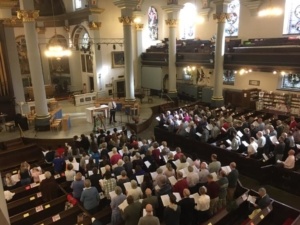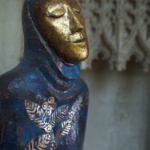It is very good to be here. Thank you for the music. Thank you for all that is invested in giving glory to God through choirs across the Diocese and through the Royal School of church music.
What do you think is at the centre of the universe? The excellent new Dr Who last week was in Sheffield but I think tomorrow ventures into outer space. Perhaps we will find out.
A long time ago, our ancestors believed the earth itself was at the physical centre of creation. The sun and moon and stars orbited our own planet. We were ourselves therefore near the centre of the universe.
Almost 500 years ago, Nicholas Copernicus, the German mathematician and astronomer, demonstrated that the sun and not the earth was the centre of the solar system. It was a massive revolution in self-understanding. The planets orbit the sun and not the other way round.
But then we discovered that our sun is one of billions of stars and our galaxy is one of millions of galaxies and a rather modest one at that. We learned that the universe has been expanding for the last 14 billion years since the Big Bang. And actually there is no physical centre for reasons I don’t fully understand. We are in a vast expanse of space but the universe itself gives no clue about meaning, except that we are physically a tiny part of creation.
So what is at the centre of the universe?
If you love the Anglican choral tradition, you will soon grow to love the psalms – at least I hope you do. Their phrases will stay with you for years. The psalms are at the very centre of the Bible. The psalms emerged from generations of Hebrew poets, men and women, wrestling. They were wrestling with faith and anger and pain, guilt and passion, pride and shame, trust and hate: all the things we feel.
The Hebrews of our Old Testament were forbidden from making graven images. It’s there in the second commandment. The visual arts played very little part in their worship for that reason. Instead the energy of the Hebrews was poured into crafting songs and choirs and music in which all the drama of life was present. Their mixed choirs were famous throughout the civilised world. People would come on pilgrimage to Jerusalem especially at festival time. They would camp around the city, like an early Glastonbury.
By and large they would come not to sing but to listen and often to walk in procession. They would come with their questions and their suffering and their wrestling with meaning. And as they listened they would identify with the psalms where everything was falling apart and with the drama of the ancient stories. But then slowly, as they listened their world would begin to make sense again. Patterns and meanings and reason begin to appear in the beauty of the liturgy and music. There would be new strength and healing and reconciliation and new resolutions for the journey home.
What is at the very centre of the universe?
Psalm 118 was sung to us this evening, very beautifully. Thank you. Psalm 118 contains all of that wrestling and drama. It is a song about suffering and danger and death and victory and coming through adversity and rejection to triumph. Psalm 118 is a collection of songs for different choirs and soloists. It’s the libretto for a whole drama to be acted out in procession.
And at the beginning and the end of the Psalm there is an answer to the question: what is at the very centre of the universe? The question is answered not in terms of geography but in terms of meaning.
O give thanks to the LORD for he is good
His steadfast love endures for ever.Let Israel say, His steadfast love endures for ever.
Let the house of Aaron say, His steadfast love endures for ever.
Let those who fear the LORD say, His steadfast love endures for ever.
At the end of the psalm we return to the beginning:
O give thanks to the LORD for he is good.
His steadfast love endures for ever.
The same refrain runs through many of the other psalms. At the very centre of the universe, the psalms tell us, is nothing other than love: the strong, steadfast love and mercy of God, enduring generation after generation, deeper than any human sorrow, higher than any human aspiration, wider than any human heart can embrace. This is a love which endures, which forgives, which believes and which hopes.
This is the story you commit yourself to singing as a musician of the Church. It’s the story and the centre of all church music. As you play and sing, you are rehearsing the love of God. Through your art, you are helping others to find and understand a little more the love which is beyond our understanding.
This is the story and the song which runs through the best of music in every generation, which recurs in unexpected places: that love is powerful and strong and endures despite all of the evil in the world.
This is the very centre of the universe. This is the love which takes flesh in Jesus Christ. This is the love which guides and shapes our lives.
In the words of the recent song by the American country singer, Carrie Underwood:
Love will, love can, love still, love wins.
Love will, love can, love still, love wins.
To sing of that love with the best of human skill and craft, to dedicate yourself to the telling of love’s story is a high and holy calling. May God bless you as you sing:
O give thanks to the LORD for he is good.
His steadfast love endures for ever.

The choirs practice together before the service starts at St. Mary’s Church, Banbury
A sermon at the RSCM Annual Diocesan Choirs Festival
Saturday, 13 October 2018


